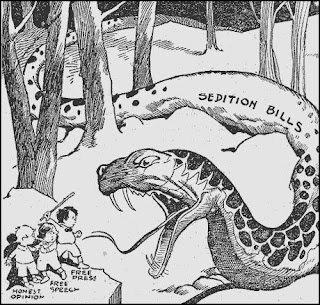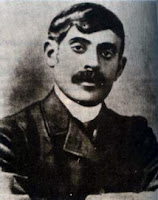Can Reason Prevail?

"When morning first blush'd illume'd in the East, I haste to my daily employment; I grub all the day, while the well-born feast, Tho' they can afford the enjoyment. Our rulers can feast on six dollars per day, the poor must be taxed their extortion to pay; and if we do against them anything say, they will trump a bill of sedition." -Isaiah Thomas, "The Sedition Act Song" , 1798 Image above entitled "As Gag-Rulers Would Have It" by Satterfield in the Jersey City Journal During what historians call the 'peaceful transfer of power' at the inauguration of 1801, then president, Thomas Jefferson, stated, " But every difference of opinion is not a difference of principle. We have called by different names brethren of measures of safety. We are all Republicans, we are all Federalists. If there by any among us who wish to dissolve this Union, or change its republican form, let them stand undisturbed as monuments of safety with which error





